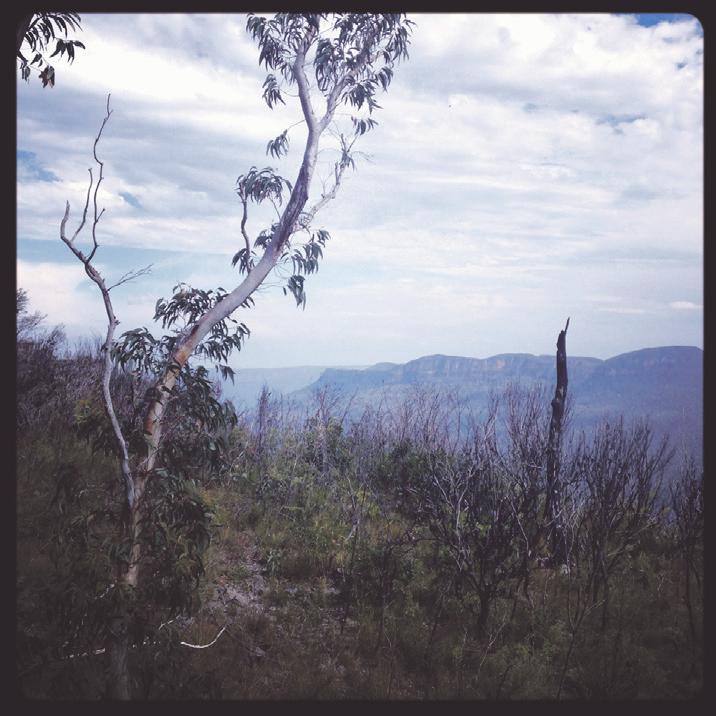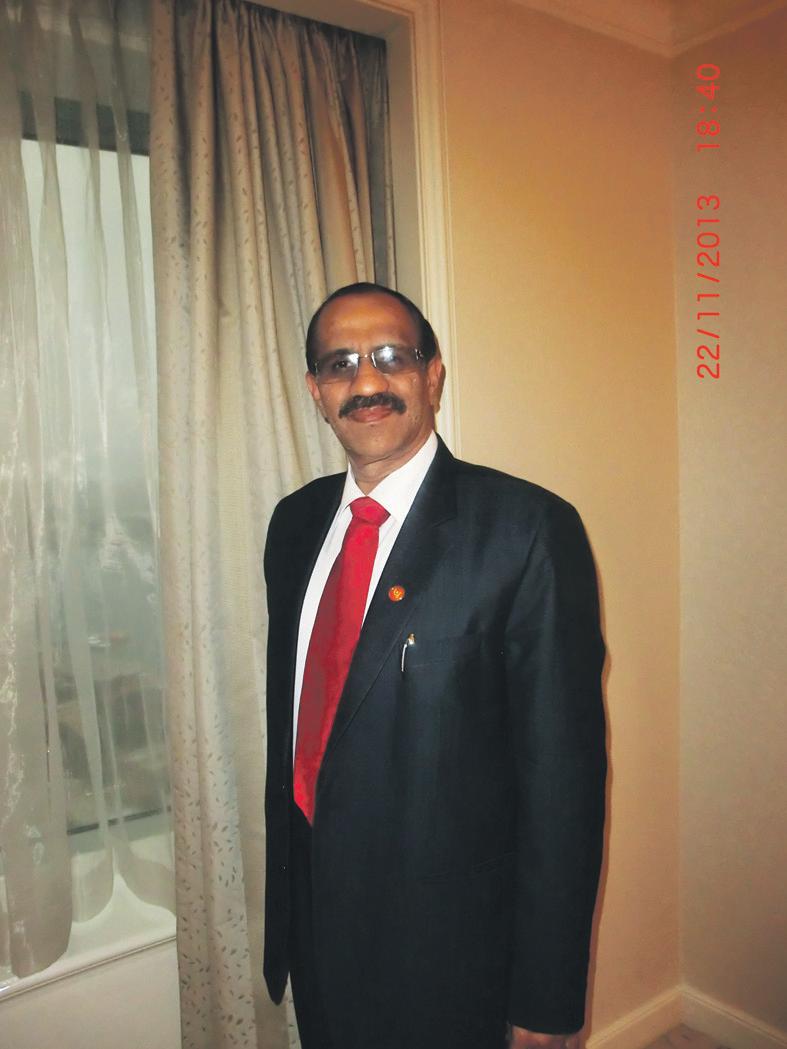
9 minute read
In a word: happening!
from 2013-12 Sydney (1)
by Indian Link
EDITOR
Lena Peacock
Sheryl Dixit
MELBOURNE COORDINATOR
Preeti Jabbal
CONTRIBUTORS
Tarun Kapoor, Lily Rose Robertson, Kritika Rao, Avi Chandiok, Farzana Shakir, Karthikeyan Subramanian, Jyoti Shankar, Noel G De Souza, Mohan Dhall, Geeta Khurana, Chitra Sudarshan, Rani Jhala, Petra O’Neill, Nancy Jade Althea, LP Ayer
ADVERTISING MANAGER
Vivek Trivedi
02 9262 1766
ADVERTISING ASSISTANT
Nitika Sondhi
02 9279 2004
DESIGN
Danielle Cairis
Proud member of:
Indian Link is a fortnightly newspaper published in English. No material, including advertisements designed by Indian Link, may be reproduced in part or in whole without the written consent of the editor. Opinions carried in Indian Link are those of the writers and not necessarily endorsed by Indian Link. All correspondence should be addressed to
Indian Link
Level 24/44 Market St, Sydney 2000 or GPO Box 108, Sydney 2001
Ph: 02 9279-2004 Fax: 02 9279-2005
Email: info@indianlink.com.au www.indianlink.com.au
If 2013 had to be described in one word, it would have to be, ‘happening’. While most people will have ‘hectic’ at the top of their lists, ‘happening’ best describes the year gone past for us.
In Australian politics, a lot has happened in 2013. We had three Prime Ministers in one year and yes, democracy proved to be at its very best. No blood was shed and those we chose to lead either changed those who were leading, or were changed themselves. Julia Gillard survived the first leadership challenge, but lost to Kevin Rudd in the second. Mr Rudd became Australia’s second Prime Minister in the year as a result.
Meanwhile, the opposition Coalition did not change much, including (as some said) their views from the 1990s. So the Australian public who wanted things to happen in government, elected Tony Abbott as Prime Minister. And so we have our third Prime Minister in one year!
Rudd bid an emotional adieu to politics in Parliament, much to the joy of newlyelected Labor Opposition Leader Bill Shorten.
On the international front, the most happening thing was the surveillance tactics of America and its allies. While the targets have changed, it seems the concept of eavesdropping remains the same as during the Cold War. With Edward Snowden’s revelations, President Obama had to apologise to German Chancellor Angela Merkel and currently, PM Abbott is going through a rough ride when it emerged that Australia had been snooping on phone calls in the higher echelons in Indonesia.
Positive news comes from the Middle East where some sanctions have been lifted from Iraq and were welcomed by its denizens and the reluctant international community, but the political situation in Afghanistan seems relatively unchanged.
Syria continues its civil war and Egypt is experiencing political problems too.
In India, though not a lot happened politically with the same argy bargy tactics between the two major political parties, an increase in inflation and a drop in Indian economic growth resulted in a review of India’s credit rating. The most happening thing in sports beyond the IPL match fixing scandal was the retirement of cricketing god Sachin Tendulkar.
Many natural disasters have stirred up more debate about global warming and its effects. The typhoon in the Philippines, the earthquake in China and the Uttarakhand flood disaster in India were just some of the many events resulting in serious loss of life and property. Closer to home were the NSW bushfires that created a haze of smoke over Sydney that lasted for days!
Manmade events of destruction like the Kenya mall shootings and the Syria chemical attack allegations shocked the world, while the US shutdown shook the world.
In the local community, a lot has been happening too. While we had great opportunities to interact and promote our culture at various melas and get-togethers, the Pravasi Bharatiya Diwas in Sydney could have been a great happening, but ended up being a non-happening event. We were graced with the presence of Shahrukh Khan who made the audience wait for over 90 minutes before anything happened.
So what will 2014 bring? Will a repeat of the Rudd-Gillard scenario occur in the Coalition Party? Will PM Abbott’s visit to India develop Indo-Oz relations? Will India choose a new government to its helm? Well, we’ll just have to wait and see.
But from all of us at Indian Link, we wish you a very happy New Year and all the very best in 2014. And if you have to pick a word to describe the coming year, start with relaxing, adventurous, prosperous, fun, family, positive change, healthy and happiness. Here’s wishing that they all come true for you.
Pawan Luthra is the 2012 Parliament of NSW Multicultural Journalist of the Year.





Contact Details:

Amrit P Jagota (MARN 0532014)
Mobile Contact Number 0414 338 423
Manvinder K Josan (MARN 0962796)
Mobile Contact Number 0410 719 375
Suite 4, Level 1, Murray Arcade 127-133 Burwood Road, Burwood NSW 2134
Phone: (02) 9747 6071 Fax (02) 9747 4031

Roads, television and mobiles to drive Bank of Baroda’s future growth
are in the rural areas and about 25% are in semi-rural areas,” he revealed.
PAWAN LUTHRA
“Retail business is not only in the metro cities of India but in the villages as well, where roads, television and mobile technology is going to drive growth,” SS Mundra, Chairman and Managing Director of Bank of Baroda told Indian Link in an exclusive interview in Sydney recently.

Mr Mundra was visiting Australia to take stock of the bank’s local operations and meet with its clients, customers and well-wishers. Although he is soon to retire, Mr Mundra’s passion and knowledge of banking was clearly evidence during his interview.
“Yes, there has been low GDP growth in India but going forward, Bank of Baroda is well positioned to capture more business in the retail market. Of our 4,600 branches in India, about 40%
“There is currently a whole lot of urbanisation going on within India. It is as if the country is churning, and in fact, if you look at it from a satellite, India will look like a cauldron,” he added, somewhat illustratively. He spoke of the three big drivers being the roads, television and mobile technology.
“The roads are making transport easier, and places in the country which were cut due to seasonal conditions for months in a year, are now connecting to the local town,” explained Mr Mundra. “Television is creating awareness and encouraging lifestyle ambitions, and mobile technology is allowing for price discovery for selling commodities to the consumer,” he added. “The agriculture sector which suffered from disguised employment now has farmers who, with this new-found connectivity, have ambitions. They want a house in their nearest town, they want to provide education to their children, and they want to start a new business. Bank of Baroda is there to help them with all this,” he proclaimed.
Mr Mundra sees opportunities in the emerging middle class. “According to a latest survey, by 2015-16, up to 56.7 million households will upgrade to the middle class. That is a staggering 267 million people migrating from the lower class to the middle class, and there are great banking opportunities to consider,” he said. In fact, by March 2014, Mr Mundra’s ambition for the bank is to be a ‘TTB’ – a Rs10 trillion bank or a Rs10 lakh crore bank, with proper risk management.
“The platforms which will help achieve this goal is not only the retail lending in rural India, but also ramping up our alternative delivery mechanism by bringing in state of the art technology,” he averred.
Mr Mundra is quite dismissive about the threat from private banks to public sector banking in India. “Death notices for public sector banks were written in 1993-94 when licences were granted, then again in 2003-04. All that did was to make the public sector banks more efficient, and took away any complacent practices. New banks need time to scale up, which is not easy,” he claimed.
In fact, he feels that private sector banks feel more threatened by public sector banks.
Talking about rising inflation in India, Mr Mundra feels that this increase is largely due to two items, food and fuel.
“What needs to be fixed is the supplier side of things, and that will take time. There is a lot of wastage in the food chain which
KR Kamath is confident of not just the progress of the bank, but also of the Indian economy
Mr KR Kamath has the unique distinction of being the youngest Chairman and Managing Director of a major bank in India. He comes across a man with clarity, vision and strong communication skills. Now, just a few months short of completing his five year tenure with the bank, there are strong indications that his tenure in the highest echelons of the Indian banking sector will continue post his term with the Punjab National Bank (PNB)
Mr Kamath was in Australia recently to progress the status of the local PNB branch, from a representative office to a full branch. While local consultants KPMG followed the formalities, Mr Kamath was here to meet personally with the Chairman of the Australian Prudential and Regulatory Authority (APRA), to inform him about the formal intentions of his bank to lodge their papers.
Speaking to Indian Link after his meeting with the APRA chairman, Mr Kamath was pleased with the success of the local office. He was also confident that the Indian economy with the efforts of the Indian government and the Reserve Bank of India (RBI), would reach a GDP growth of 8-9% in the next six months.
“Green shoots are emerging due to their efforts and I expect this figure to be attained in the next six months, despite the elections and whichever Government comes into power,” he stated confidently.
Mr Kamath also admitted that it was not possible for the Indian economy to continually grow at 9%, and the recent slowdown gave them a chance to be introspective and take corrective actions. “We can recover the lost pace of growth,” he further stated.
Talking about international influences on the Indian banking systems, he acknowledged that India is part of the global banking system and is not isolated. “But India’s growth story is based on domestic demand. Over the next few years, over 30% of our population will come into an income earning bracket, which will create demand for our growth and services. While we have the potential of being effected by any international movements, our domestic demand will act as shock absorbers for any downturn,” Mr
Kamath said.
Commenting on the current high inflation in India and the role monetary policy can have in keeping inflation in check, he said that high interest rates can only control demand, whereas in India, the problem is in the supply side. “Though interest rates are very high in India, the real rate of interest after we take inflation into account is quite low,” he noted.
Mr Kamath is very proud of the progress made in PNB under his tenure. “PNB is the first bank set up over 188 years ago by Indians, for Indians and managed by Indians. We are the second largest bank in India in terms of network,” he proudly announced.
He admitted that PNB at times is perceived to be a north Indian bank, but quickly pointed out their extensive network of branches in Kerala and Tamil Naidu. He laughingly agreed that marrying his south Indian background and the north Indian character of the bank truly makes it a national bank.
“Yes, I did think about changing the name (of the bank) but it was a very brief thought, as I felt the Chairman and MD should spend his time and energy on better things. There are strong emotions attached to our name and logo,” stated Mr Kamath.


“We have not only the brick and mortar customers who like to go to their branches and get their passbooks updated and have a cup of tea, but we also have the younger generation who are more technologically friendly, who would not even know the location of their nearest branch. Our challenge is to meet the needs of both while reaching out to 60% of Indians who do not have a bank account,” he told Indian Link
It is clear to see why Mr Kamath was judged by the Economic Times as one of the most powerful CEO’s among nationalised banks in India.
Pawan Luthra
needs to be controlled. For fuel we are subject to international variation, but India does have vast energy resources,” explained Mr Mundra. “These need to be ramped up and yes, massive infrastructure investment is required in these areas. However, the good thing is that in the last four to five months, a lot of good work has been done by the government and I’m very confident that things will start looking up in a short period of time,” he asserts.
Mr Mundra urged settled NRIs to engage more with India and to bring their expertise to their country of origin, thus becoming a part of the ‘Indian Success Story’.










